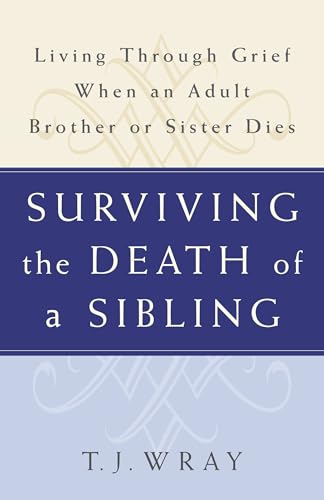SURVIVING THE DEATH OF A SIBLING
Living Through Grief When an Adult Brother or Sister Dies
T.J. Wray
BOOK REVIEW

Losing a sibling can feel like losing a part of your very soul. It's a heart-wrenching experience that reshapes your identity. In Surviving the Death of a Sibling: Living Through Grief When an Adult Brother or Sister Dies, T.J. Wray delves deep into this harrowing emotional territory, creating a safe haven for those drowning in despair. This remarkable work is not just a book, but rather a poignant companion for anyone grappling with the profound and often misunderstood grief that accompanies the death of a brother or sister.
As you leaf through the pages of Wray's insightful exploration, the text feels less like a guide and more like a dialogue with a friend who truly understands your pain. The rawness of her prose draws you in, inviting you to confront the intensity of your emotions. Wray herself faced the devastating loss of her brother, and her personal narrative weaves seamlessly with her academic insights. This is not merely theory; it's a visceral recounting of her journey through grief, which fuels the book with authenticity and credibility.
Within these pages, Wray shines a beam of light into the abyss of sorrow-discussing feelings of anger, loneliness, and confusion that often accompany such a loss. Her words resonate like a powerful melody, striking chords deep within. The staggering reality is that nearly everyone can relate to the intense feelings of helplessness that accompany losing a sibling; however, few are aware of how to navigate these treacherous waters. Wray's wisdom doesn't just provide a lifeline; she equips readers with the understanding that grief is not a linear process. Instead, it is a wild, unpredictable journey, where joy and despair intermingle, often in the same breath.
For many readers, Wray becomes a beacon of hope. The book is rich with practical advice, offering tools to not only survive but to thrive in the aftermath of loss. Her insights challenge the societal norms surrounding grief-reminding us that it's okay to grieve loudly, to express deep sorrow, and to find solace in shared experiences. You'll feel deeply seen, as Wray validates feelings that many people suppress under societal expectations, thus liberating readers who might have felt alone in their suffering.
What strikes a chord with readers is Wray's unflinching honesty about the complexities of sibling relationships. The strength of her arguments stems not only from her personal experience but also from her academic rigor. She draws on research while mastering the art of storytelling, thus creating a tapestry of human experiences that resonates across the board.
While some might question whether a book can truly heal the profound pain of losing a sibling, Wray compellingly counters this skepticism. The testimonies from readers reveal just how transformative this book can be. Some share how it helped them communicate better with others who were experiencing similar feelings, while others mention how it inspired them to cherish their own familial relationships. Wray doesn't promise an easy way out of grief, but she does offer a path to understanding and acceptance, enabling readers to honor their lost siblings while moving forward.
This is a book that dares to tread where many fear to go, exploring the raw, naked emotions that often get swept under the rug. People have expressed feelings of rage and betrayal as they navigated their own grief, and Wray points out the importance of recognizing and acknowledging these powerful waves. After all, it's this acknowledgment that paves the way for deeper healing and connection.
The historical and cultural contexts surrounding grief play a significant role in Wray's analysis. She thoughtfully examines how societal norms shape our understanding of sibling loss and the validate space necessary for mourning openly. In a culture that often underplays sibling relationships, Wray courageously advocates for the importance of these connections, urging readers to acknowledge the weight of their grief without shame or fear.
Surviving the Death of a Sibling is more than just a book; it's an essential guide for the aching heart, a profound resource that empowers one to rise from the ashes of despair. Wray's beautiful and brave narrative invites you not only to reflect but to begin a dialogue with your own pain. As you progress through the pages, you might find yourself shedding tears, laughing out loud, or feeling a sudden spark of hope.
Whether you are currently wrestling with grief or seeking to understand the experiences of others, this book beckons you. Don't let the opportunity to delve into this emotional odyssey pass you by. Engage deeply with your own emotions, embrace the healing process, and discover the transformative power of love and loss. In a world so eager to placate discomfort, Wray stands firm, challenging you to confront the truth of your emotions head-on.
📖 SURVIVING THE DEATH OF A SIBLING: Living Through Grief When an Adult Brother or Sister Dies
✍ by T.J. Wray
🧾 247 pages
2003
#surviving #death #sibling #living #through #grief #when #adult #brother #sister #dies #tj #wray #TJWray